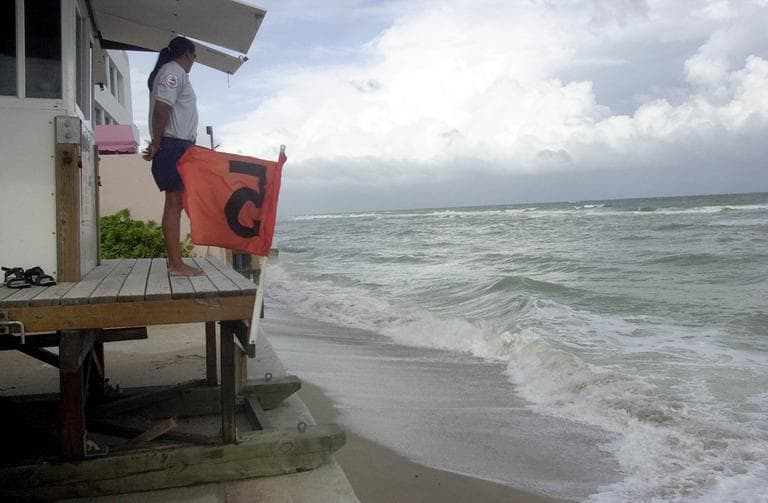Advertisement
What Lifeguard's Firing Says About Outsourcing
Resume
Tomas Lopez is the college student who was fired earlier this month from his job life guarding at a public beach in Florida because, despite his supervisors orders, he left his post to help a distressed swimmer in an unguarded section of the beach.
His supervisor worked for Jeff Ellis and Associates, Inc., a private contractor hired by the city of Hallandale Beach to manage the lifeguards --something the fire department used to do.
A Parable About Outsourcing
“No one is asking you ever to exercise discretion. The system has the intelligence, they don’t need people with intelligence.”
Steve Pearlstein, columnist
"There are different models of how to do business, but one model that we see a lot in outsourcing is to hire people who have less experience," he told Here & Now's Robin Young. "But then you equip them with all sorts of systems. The experience and the knowledge is embedded in the system."
Pearlstein gives the example of how people who cook at McDonald's don't have to be chefs.
"Why don't you have to be a cook? Because they tell you everything to do by the second," he said. "No one is asking you to exercise discretion. The system has the intelligence, they don't need people with intelligence."
Another Possible Outcome
Pearlstein says that if the life guarding services had not been outsourced, the outcome in Lopez's situation probably would have been different.
"Tomas Lopez was a 20-year-old kid, he was doing this for the summer," he said. "If the city had been running it it probably would've been something closer to either a full-time employee or someone who did it every year, who has more experience. They didn't have so many rules, they're more apt to be told to exercise their discretion."
What's Behind Savings
Pearlstein says the systemic approach is analogous to what's used in contracting. "We don't hire experienced high-priced people, that's how we save the money," he said. "But we don't give you much inferior service because most of the time there's enough intelligence in our procedures... that make it possible for us to do almost as good for a lot less money."
The community of Hallandale Beach says that by hiring the Jeff Ellis management company for life guarding, they cut the city's annual $700,000 budget for lifeguards in half.
As Pearlstein writes:
Because [contractors] are generally free from union contracts and the unwritten norms of pay equality that exist within any enterprise, contractors are able to pay lower wages and benefits — in many cases, a lot lower. That was certainly the case with Ellis and the Hallandale lifeguards.
Pearlstein estimates that the lifeguards at Jeff Ellis were paid $8 or $9 an hour. Which is part of why when lifeguard Thomas Lopez was offered his job back, he declined, saying the job wasn't worth the low pay.
Pearlstein also points out that the contractor, Jeff Ellis, hasn't had a single drowning in the nine years they've been operating in Florida.
A System Of Trade-offs
There are trade-offs to using contractors, says Pearlstein. On the one side, contractors can save towns money, because they often re-allocate low-skilled work to lower-skilled workers who are paid less. That becomes a problem, however, if the lower-skilled workers are suddenly faced with a task that requires more experience. As Pearlstein writes:
If you want discretion and judgment, if you want workers who really understand and relate to customers, if you want the flexibility necessary to respond to individual needs or unforeseen circumstances, then you can go back to paying twice as much to have your own, longtime employees doing the work. That’s the outsourcing trade-off. It may be a good trade-off — most of the time I suspect it is. But it is an unavoidable trade-off, no matter how good the contractors or their systems.
The Rescue
By the time Lopez got to the struggling man in the water, another swimmer with a boogie board had started rescuing him.
Lopez then stepped in and performed CPR. As the Miami Herald reports:
“He was coughing up water,” López said. “You could tell he lacked oxygen.”
The man was transported to Aventura Hospital, where he was treated and is doing fine, said Hallandale Beach spokesman Peter Dobens.
- Washington Post: A Parable About Outsourcing
Guest:
- Steve Pearlstein, business columnist for The Washington Post
This segment aired on July 17, 2012.